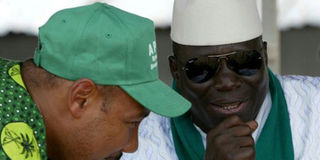Gambia's ex-number two buries hatchet with man he had arrested

Gambia's former President Yahya Jammeh (R) and ex-army captain Edward Singhateh, both seen here in 2006. PHOTO | SEYLLOU DIALLO | AFP
What you need to know:
- Singhateh had admitted being "partially responsible" for the arrest, torture and execution of suspected political opponents during Jammeh's 22-year reign.
- Singhateh had told Gambia's Truth, Reconciliation and Reparations Committee that he was personally responsible for the arrest of Sana Sabally.
- The two men publicly buried the hatchet on Wednesday, shaking hands and then embracing in front of television cameras.
BANJUL,
The right-hand man of Gambia's former president Yahya Jammeh made peace Wednesday with a former fellow officer whom he arrested following the 1994 military coup for allegedly plotting against the leader.
Earlier this week, former army captain Edward Singhateh had told Gambia's Truth, Reconciliation and Reparations Committee (TRRC) that he was personally responsible for the arrest of Sana Sabally -- a fellow putschist -- in November 1994.
Sabally was subsequently tortured and spent nine years in prison.
ADMISSION OF GUILT
But Singhateh testified that the investigation that had led to Sabally's conviction -- and which alleged he had attempted to shoot Jammeh -- was built on a web of lies.
On Monday, Singhateh had admitted being "partially responsible" for the arrest, torture and execution of suspected political opponents during Jammeh's 22-year reign.
Another figure involved in the coup, Sadibou Hydara -- whom Singhateh also had arrested -- died in detention.
"Anything that has happened, I feel partially responsible, and for that I'm deeply remorseful," he had told the TRRC on Monday.
FORGIVEN
In the wake of that testimony, the two men publicly buried the hatchet on Wednesday, shaking hands and then embracing in front of television cameras.
"When I listened to Edward's testimony, I understood we fall in the same category -- either way we were victims, either way we were oppressors," Sabally said.
"So I decided to initiate the line so that we can reconcile for our personal interest but also so that we can (jointly) ask for forgiveness (from) the nation, so that the victims can find it in their hearts to forgive us," he said.
Singhateh, for his part, said: "We should not have been in this situation right now. This is not what we decided in 1994."
Addressing Sabally, he said: "I cannot express the regret my contribution of putting you through and what your family went through. At least today we have shaken hands and as we used to do before what happened."
JAMMEH REGIME
Jammeh had come to power in a bloodless coup in July 1994 and was repeatedly re-elected in disputed circumstances until being defeated in December 2016 by the relatively unknown Adama Barrow.
British-born Singhateh held a number of top government positions, including that of defence minister, under Jammeh who fled the country in January 2017 after losing presidential elections and initially refusing to step down.
After other West African states intervened, Jammeh fled into exile in the central African state of Equatorial Guinea.
Human rights activists accuse Jammeh's regime of torturing opponents, summary executions, forced disappearances and rape.





